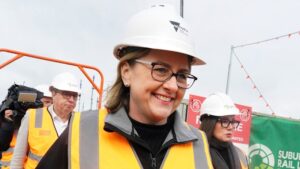
Albanes Government Secracy illustration :Don Lindsay
URGENT UPDATE: Independent ACT Senator David Pocock has launched a significant revolt against the Albanese Government, accusing it of unprecedented secrecy in a dramatic Senate showdown on Wednesday. The clash underscores growing tensions as the government faces calls for greater transparency regarding a damning report on public sector appointments.
Pocock, once a crucial ally for Labor, has become a vocal critic, declaring the current administration one of the “most secretive governments in the last 30 years.” His remarks come as the government refuses to release a report by former public service commissioner Lynelle Briggs, which was completed in July 2023 but has been withheld, likely due to its embarrassing contents for Labor.
In a rare political alignment, Pocock united the Coalition, Greens, and other crossbenchers to extend Senate question time by an additional thirty minutes, focusing solely on the government’s lack of transparency. This move comes amid accusations that the Albanese administration is mirroring the secrecy of the previous Morrison government.
Finance Minister Katy Gallagher claims the government is still “working on the report,” although critics argue this is merely a delay tactic. The Senate’s non-government senators are demanding the release of the Briggs report, which examines the controversial “jobs for mates” culture that has plagued Australian politics.
James Paterson, a Liberal frontbencher, stated, “The government’s response is more like that of a petty authoritarian government than a democratic one.” The political landscape is shifting dramatically as the Senate’s opposition showcases its ability to challenge the executive branch, a significant test of strength for the Albanese Government.
The Centre for Public Integrity (CPI) has also chimed in, releasing a report card that highlights Labor’s disappointing integrity record and calls for a “reset course” to honor its commitments to transparency and accountability. The CPI’s findings reveal that the government has not adequately addressed concerns about lobbying and the influence of special interests, raising alarms over the integrity of Australian democracy.
Observers are concerned that the Albanese Government is leaning into a culture of secrecy, further exacerbated by proposed changes to Freedom of Information (FOI) laws that would inhibit access to vital governmental information. The CPI has criticized the government’s allocation of resources to the opposition, claiming it undermines the ability to hold the government accountable.
As the Senate prepares for further confrontations, the pressure is mounting on the Albanese administration to address these critical issues. The public and political opposition are demanding not only the release of the Briggs report but also comprehensive reforms to ensure merit-based appointments across the public sector.
The situation is developing rapidly, and all eyes are on the government as it navigates this political storm. Will Labor respond to the mounting pressure for transparency, or will its penchant for secrecy continue to fuel dissent? The outcome could reshape the relationship between the Senate and the executive branch in Australia.






